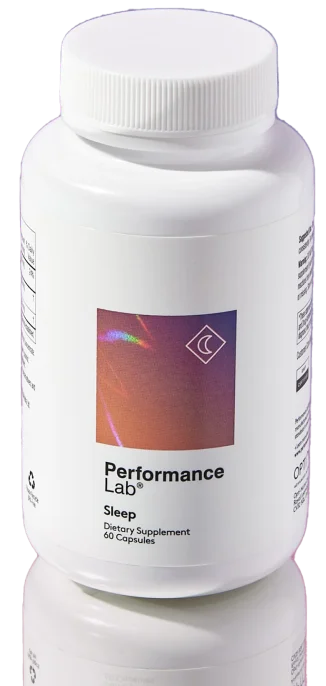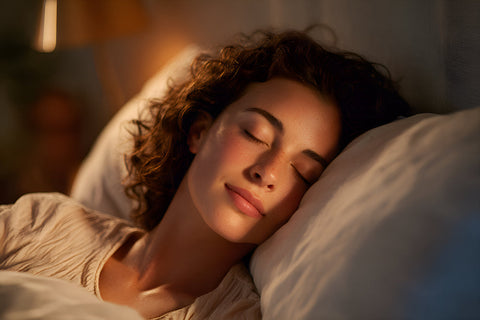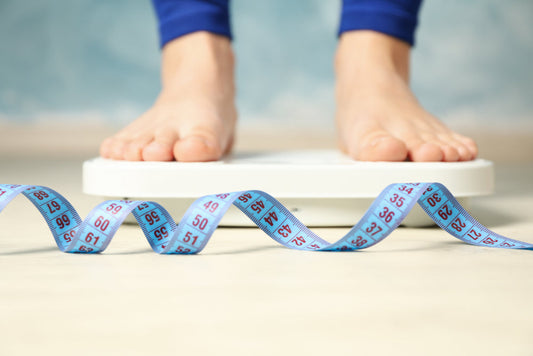Are you struggling to gain a good night's sleep? Being driven crazy with sleep problems? If your sleep habits consist of staring at the ceiling for hours on end, you may need a little help.
And perhaps, just perhaps, that help could be in the form of a humble little vitamin.
Vitamin D, the sunshine vitamin, is known to help strengthen bones and support the immune system, but there is growing evidence that it also plays a crucial role in sleep regulation.
It seems odd for a daytime vitamin to be associated with sleep, doesn't it? But vitamin D deficiency has been linked to sleep disturbances and poor sleep quality. Possibly because of its connection to melatonin production and the sleep-wake cycle (circadian rhythm sleep).
Vitamin D deficiency is common, so let's see what we can learn about it...
The Science of Vitamin D

Vitamin D is a fat soluble vitamin that is needed for several benefits in the body. We'll get to those shortly, but did you know that there are actually two forms of vitamin D?
There's D2 - the type you can gain from food - and D3, synthesized in the skin during exposure to sunlight (also available in some foods). The latter form, D3, is considered the better form for us as it's more potent and longer-lasting. (1)
You can also top up your levels of vitamin D using dietary supplements when the sun isn't shining as much, or if your levels are low.
Why Do We Need Vitamin D?
So, why do we need vitamin D, and what is it used for in the body? Vitamin D is crucial for:
-
Strong bones. Vitamin D helps the body to absorb calcium needed for strong bones and may help to protect against osteoporosis.
-
Muscle growth. May help to prevent cramps and spasms of the muscles
-
Immune function
-
Reducing inflammation
-
Allowing nerves to send messages between the brain and the body. (2)
These are all well-known benefits of vitamin D, but there may be another one -- helping our sleep habits.
Vitamin D receptors are present in areas of the brain that control sleep, suggesting a direct link between vitamin D and sleep regulation. Indeed, vitamin D deficiency has been linked to interruptions in our sleep-wake cycle, sleep disorders, insomnia symptoms, and more.
Before we discuss that in more detail, let's get the nuts and bolts out of the way - how much vitamin D do we need? And where can we find it?
How Much Vitamin D Do We Need?
The recommended daily intake of vitamin D varies by age and other factors, but most adults need at least 600-800 IU per day.
Specific recommendations from the Food and Nutrition Board are:
Adults aged 19-70: 15mcg (600IU)
Aged 71 and above: 20mcg (800IU). (3).
Where to Find Vitamin D
Sunlight

You've heard vitamin D called the 'sunshine vitamin', right? That's because most of us get some of our vitamin D needs met through exposure to sunlight.
UVB radiation penetrates the skin, converting vitamin D3 precursor (technical name 7-dehydrocholesterol) into previtamin D3, which then becomes vitamin D3.
Of course, many things can influence how much vitamin D our bodies are able to make from this source.
The season and the weather, for one thing. Time of day, length of day, cloud cover, use of sunscreen, how much melatonin we naturally have in our skin... even our age! Older adults are not able to produce as much vitamin D, ditto people with darker skin.
Note too that UVB radiation isn't able to penetrate glass, so sunshine through a window doesn't produce vitamin D.
From Food
Let's be honest: it's difficult to gain enough vitamin D from food alone. Vitamin D is found in only a few foods, such as cheese, egg yolk, beef liver, fatty fish (the flesh of salmon, tuna, mackerel, trout), and fish liver oils.
I don't know about you but out of that list, only cheese and eggs appeal to me - and they contain only small amounts of vitamin D!
That's why many foods are fortified with extra vitamin D in the United States - nearly all of the milk supply, for instance, and other dairy products. Breakfast cereals may also be fortified.
Despite that, many people still don't gain enough vitamin D from food on its own, and possibly not from the sun either. In which case, they may want to supplement...
Dietary Supplements
Given that most people in the United States consume less than the recommended amounts of vitamin D (as stated by the National Health and Nutrition Examination Survey), you may want to consider topping up with a vitamin D dietary supplement. (4)
You'll find vitamin D2 and D3 dietary supplements available. Both can raise serum vitamin D levels, but research shows that vitamin D3 raises it more and lasts for longer than D2. So you'd probably want to opt for D3 vitamins.
People More Likely to Have Lower Vitamin D Levels
Certain groups of people are more likely than others to have low vitamin D status. Such as older adults and people with darker skin, as mentioned; breastfed infants; people who limit their sun exposure; people who cover their skin; obese people or those with conditions that limit how their body absorbs fat.
Likewise, vitamin D deficiency is more prevalent among people who have an allergy to milk or are lactose intolerant, and people who follow a vegan diet or an ovo-vegetarian one.
These groups may want to add a vitamin D supplement to their daily regimen. (5)
Best Vitamin D3 Dietary Supplement

Performance Lab D3 + K2 is a quality vitamin D supplement - in the useful D3 form. It is vegan certified (useful as vegans are often low in vitamin D) and combines vitamin D with vitamin K2, known to support bone mineralisation.
It delivers your daily dose of vitamin D in pill form. Together it's a powerful stack for bones, immune function, cardio... and potentially sleep!
Does Vitamin D Help You Sleep?

Now that we know the basics about vitamin D, let's examine the big question: Does vitamin D help with sleep?
The potential link between vitamin D and sleep is a hot button topic in sleep research. Various studies have examined the nutrient's potential ability to regulate sleep, though more research is needed.
What seems to be clear from the studies done so far is that a lack of vitamin D is associated with an increased risk of sleep disturbances and sleep difficulties.
Simply put: while vitamin D on its own may not make you sleepy, a lack of it might lead to poor quality sleep.
Considering approximately a third of U.S. adults are thought to be deficient in vitamin D, this is a big concern. (6)
While more sleep research is definitely needed into this topic, here's what we know so far...
Vitamin D Deficiency Is Linked to...
Sleep Disorders

Research has found that people seeking help for sleep medicine often demonstrate inadequate levels of vitamin D. Researchers theorise this may contribute to or worsen common sleep disorder symptoms, such as subjective sleep quality and nonspecific pain.
Some have even suggested that a lack of vitamin D may contribute to the prevalence of sleep disorders worldwide. (7)
One 2022 meta-analysis of vitamin D sleep studies involving more than 9,000 people concluded that study participants with vitamin D deficiency had an increased risk of sleep disorders. Vitamin D deficiency was also linked to poor sleep quality, short sleep duration, and daytime sleepiness. (8)
Another systematic analysis examining past studies confirmed that people with sleep disorders had lower serum levels of vitamin D than people without sleep issues. (9)
Obstructive Sleep Apnea
A further study concluded that low serum levels of vitamin D may be linked to the development of one of the most common types of sleep disorder, Obstructive Sleep Apnea Syndrome (OSAS).
OSAS is a potentially serious sleep disorder where breathing stops and starts throughout the night, and the throat relaxes and blocks flow of air into the lungs.
Approximately, 24-33% of Americans - up to 85m adults - are believed to suffer from OSA. Only 1 in 5 of those are likely to have an official diagnosis. (10)
Research suggests vitamin D deficiency could intensify as the severity of OSA worsens. (11)
It is currently unclear whether a shortage of vitamin D contributes to OSA or whether OSA somehow predisposes people to vitamin D deficiency. Further research is welcome. (12, 13)
Non-Specific Pain
Chronic non-specific pain seems to be a marker of Vitamin D deficiency, seen with a high prevalence among patients who complained about pain of an unknown cause. Such patients tend to experience an increased risk of short sleep duration and poor sleep quality.
One Canadian study concluded that the sleep of middle aged women with such chronic non-specific pain was comparable to people with insomnia. (15)
Problems Staying Asleep
Studies show that gaining adequate amounts of vitamin D helps us to stay asleep - we're more likely to suffer from nocturnal awakenings if we don't have enough of the vitamin in our system. (16)
Excessive Daytime Sleepiness
A lack of vitamin D may also be connected to excessive daytime sleepiness. (17)
Restless Leg Syndrome
Restless Leg Syndrome, also known as Willis-Ekbom disease, is a neurological disorder where sufferers have an overwhelming urge to move their legs. This is often accompanied by uncomfortable sensations such as itching, aching, throbbing, or crawling in the legs.
Movement temporarily lessens the sensations. RLS can start at any age but gets worse with age. Sensations typically start at night when lying down or when sitting for long periods. People who suffer with RLS can, not surprisingly, find it hard to fall asleep and stay asleep. (18)
How does this connect to vitamin D? Having low levels of vitamin D, along with vitamins C and E, appears to statistically increase your risk of developing RLS. Several studies have shown us that adults with RLS have lower levels of Vitamin D. (19)
Summary: Vitamin D May Influence our Sleep By...

Let's summarise all of the above so we can understand the potential impact of vitamin D on our sleep at a glance.
Vitamin D deficiency has been associated with:
-
More likelihood of sleep disorders
-
Shorter sleep
-
More nocturnal awakenings
-
Reduced subjective sleep quality (feeling that you haven't had a good night's sleep)
-
Non-specific pain
-
Excessive daytime sleepiness
-
A potentially higher risk of Obstructive Sleep Apnea.
-
A higher risk of developing Restless Leg Syndrome, known to interfere with sleep.
Other Health Concerns of a Vitamin D Deficiency
Poor sleep isn't the only potential consequence of a vitamin D deficiency, of course. Potentially Vitamin D deficiency increases the risk of:
-
Loss of bone density
-
Rickets in children
-
Cognitive decline in older adults
-
Potentially other health concerns such as heart disease, cancer, type 2 diabetes, depression, hypertension and more. (20, 21)
So, How Does Vitamin D Influence Sleep?
If you're like me and you like to know the ins and outs of a subject, you may wonder how vitamin D has such a potential impact on sleep. How does a deficiency in this vitamin potentially cause sleep disorders?
The truth is - no one knows for definite. The complex mechanism by which vitamin D is connected to sleep is still being researched.
However, many people far cleverer than I have put forward several hypotheses and they would seem to make sense. They include:
-
Vitamin D receptors in the brain are connected to our sleep-wake cycle. These receptors are found in the areas known to regulate our sleep-wake cycle, or human circadian rhythms, such as the hypothalamus. They must be there for a reason, right? A lack of vitamin D may prevent these areas from functioning properly.
-
Vitamin D also helps the body to regulate serotonin and melatonin synthesis in the body - both of which contribute to the sleep-wake cycle, and keep our sleep on track.
-
Indirect influence: Vitamin D is associated with non-specific pain (as mentioned above) which in turn is associated with poor sleep. (22, 23)
Can Vitamin D Supplementation Help with Better Sleep?

Now that we know a lack of vitamin D can cause sleep problems and possibly even sleep disorders, can vitamin D supplements help us to avoid this? Could taking vitamin D even reverse sleep disturbances?
Several studies have looked at this issue, and while it looks hopeful, there are some caveats and contradictions. First, let's look at the research...
The Evidence
Study one: Veterans with chronic pain given vitamin D supplements found their sleep quality (and their pain levels) significantly improve after supplementation. It also improved various other Quality of Life scores. (24)
Study two: Adults with diagnosed sleep disorders given 50,000IU a fortnight for eight weeks were shown to enjoy better sleep after supplementation. They fell asleep faster (reduced sleep latency), slept for longer (sleep duration) and declared they had a better night's sleep (subjective sleep quality). Participants were between 20-50 years old. (25)
These studies are very promising, but other studies have slightly conflicting results - which suggest that vitamin D supplements may work better for some groups than others. For instance...
"Clinical trials have demonstrated that vitamin D supplementation significantly improves sleep quality, particularly in special populations such as the elderly and pregnant women." (26)
Study three: In contrast, a meta-study of past trials with vitamin supplementation concluded there wasn't enough evidence that vitamin D supplementation helped with Restless Leg Syndrome or Obstructive Sleep Apnea in particular. Partly because there are so few studies done on this group. (27)
These different patient groups and conditions may explain why some studies report significant improvements after vitamin D supplementation, but others don't.
Other factors may also influence the results - such as length of the study (shorter trials seem to have better results), dosages, age, gender, trial mechanics, and more. (28)
However, given that vitamin D is important for much more than sleep, it may be worth considering supplementation if you think your levels may be low. Especially if you can't gain enough vitamin D from other sources.
After all, an in-depth meta-analysis of 19 intervention studies concluded that, while more research is welcome, the link between vitamin D supplementation and sleep management is 'biologically plausible and worth investigation'. The studies done so far were promising for supplementation and sleep quality, it said. (29)
A Warning: Vitamin D supplements may interact with other medications, so please see a doctor first if you are taking other medications. A doctor can also help determine your vitamin D levels via a blood test.
Be careful not to overdo it - excessive vitamin D can be toxic for the body. Stick to recommended levels, or thereabouts, and avoid super high doses. Performance Lab D3 + K2 includes safe levels of vitamin D.
The Upper Tolerable Level for Vitamin D is 4000IU a day (100mcg). (30)
Other Dietary Supplements and Sleep
As well as vitamin D, other supplements and ingredients may help with sleep. Melatonin and magnesium are the obvious ones; both play an important role in helping to regulate sleep and improve sleep quality.
Melatonin is the sleep hormone secreted by the pineal gland when it gets dark - it's the chemical messenger that prepares your body for sleep. Magnesium helps to soothe the nerves and the central nervous system before sleep, allowing you to relax.
Tryptophan is another good one. A precursor to serotonin, which can then contribute to melatonin levels in the body, it's the reason why you feel sleepy after drinking hot milk.
Best Natural Sleep Aid

I mentioned melatonin, magnesium and tryptophan as potential alternative sleep aids to vitamin D - and all three are found in Performance Lab Sleep. The melatonin comes from Montmorency tart cherry, and is a natural safe low dose form that won't make you groggy.
This natural sleep supplement also contains lemon balm, believed to help reduce anxiety. It's a potent sleep stack that you might want to investigate further.


10 Proven Tips to Help You Sleep
Allow me to share some proven sleep tips that may help you get better sleep.
-
Increase your exposure to bright light during the day - it helps to keep your circadian rhythms healthy.
-
Conversely, reduce blue light exposure from tablets and phones in the evening. It confuses the brain's sleep-wake clock and potentially affects sleep.
-
Avoid caffeine late afternoon and evening and/ or alcohol late at night.
-
Try to stick to consistent sleep and wake times so your body clock doesn't get confused.
-
Get regular exercise or physical activity throughout the day, but not at night.
-
Make sure your mattress is comfortable, and your bedroom optimized for sleep. Keep the room at a comfortable temperature (around 18 degrees) and reduce artificial lights and noise.
-
Don't eat late in the evening. If you must eat, keep it small and avoid high carb foods.
-
Avoid liquids one to two hours before going to bed.
-
Practice relaxation techniques such as mindfulness and meditation before bed to calm the mind.
-
Choose a quality sleep supplement - ideally one containing safe low doses of melatonin - to aid your sleep. (31)
Final Thoughts
Vitamin D is a crucial nutrient, essential for maintaining overall health and, it seems, a healthy sleep pattern. Being deficient may increase the risk of sleep disorders and other health problems. Getting enough sleep is fundamental for our health.
How Many Hours of Sleep are Needed? Adults need at least seven hours of quality sleep a night.
Going without on a regular basis can weaken your immune system, increase the risk of accidents and potentially cause numerous health concerns, such as heart disease, high blood pressure, obesity, diabetes, depression, and more. (32)
We should all aim to maintain healthy vitamin D levels if we can.
It's recommended that we gain 5-30 minutes of sun exposure between 10am and 4pm, either daily or at least twice a week, without sunscreen, to build up enough vitamin D. (33)
You can also top up with vitamin D-rich foods, or with a quality vitamin D supplement. You could opt for a standalone vitamin D capsule such as Performance Lab D3 + K2, or include it in your daily multivitamin.
Performance Lab NutriGenesis Multivitamin for men and women includes a generous dose of vitamin D, alongside more than 20 other important vitamins and minerals.
Alternatively, you could add a dedicated sleep supplement like Performance Lab Sleep to your daily routine.
Combine these with a healthy sleep routine and hopefully you'll experience better sleep and fewer instances of counting sheep.
I wish you good Zzzzs!















